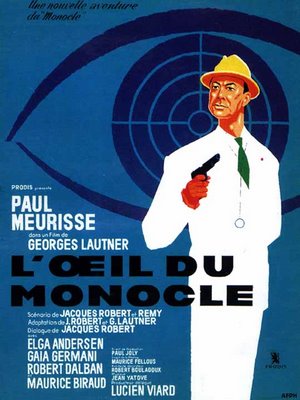
An insufferable film snob wanders off the beaten track, then comes back and talks about what he has seen.
Wednesday, November 22, 2006
Robert Altman 1925-2006
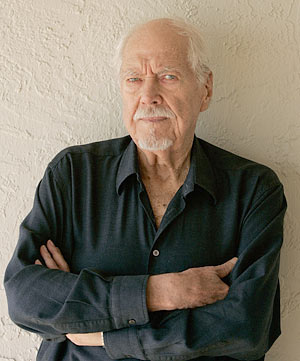
I can pretty much pinpoint the moment when I became a film lover - a REAL film lover. It happened as Keith Carradine sang "I'm Easy", and four different women believed that he was singing to them alone. That was Nashville, and I never looked at movies the same way again. You see, Robert Altman took over from that point. It was the first time I realized that film could really be something beyond just a time-filler - That it could be art.
Altman was my first favorite director, and he remains a favorite today. It was a great voyage after that first exposure to experience his work for the first time: The frightened Warren Beatty curling up in bed with Julie Christie the night before he is going to die in McCabe & Mrs. Miller. Mark Rydell's mobster breaking a beer bottle in his girlfriend's face in The Long Goodbye. Carradine again lying under a tattered blanket in Thieves Like Us.
Then, just a few years ago, I went to see Gosford Park, and marvelled that a man in his mid-seventies would create something so smart and so scabrous. At that point in his career Altman could have been forgiven for resting on his laurels a bit, but the word "coast" didn't exist for him.
Farewell, Mr. Altman. And thanks.
Monday, November 20, 2006
And Also Starring...

"This is Texas, and out here, you're on your own"
All you need to know about Blood Simple, the Coen brothers brilliant debut, is contained in that line spoken in an opening monologue by M. Emmet Walsh. Walsh plays the murderous private detective Loren Visser, and he's one of the most memorable movie villians ever to come down the pike. It's the signature role in a career of supporting parts for this versatile actor.
Visser is hired by a greasy bar owner who wants his wife and her lover murdered, and their first on-screen meeting is a marvel of slowly uncoiling malice.
"I've got a job for you"
"Well, if the pay's right and it's legal, I'll do it."
"It's not strictly legal."
"Well...If the pay's right, I'll do it."
That's what makes Visser stand out for me. Although he's plenty nasty, you get the impression that if he wasn't approached with this murder business, he might happily go on his way with other strictly legal stuff. However, he is presented with the chance for a big payday, and the fact that he has to kill two people to collect is not a big obstacle to him.
Some other notable Walsh movies - Blade Runner, Bound for Glory, Reds, The Milagro Beanfield War, and Silkwood.
Monday, November 13, 2006
Sunday, November 12, 2006
Moments of Distinction (Hitchcock Blog-a-thon)
The Set-Up - The injured photographer L. B. Jeffries (James Stewart) has decided that his neighbour Thorwald may have killed his wife. Jeffries' girlfriend Lisa (Grace Kelly) decides to investigate while he's away. She is trying to find the woman's wedding ring.
She climbs into his apartment....
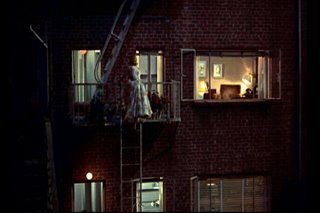
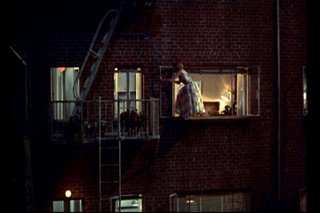 While Jeffries watches with his telephoto lens.
While Jeffries watches with his telephoto lens.
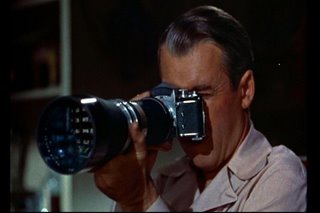 The ring isn't in her purse....Gosh, she's purty!
The ring isn't in her purse....Gosh, she's purty!
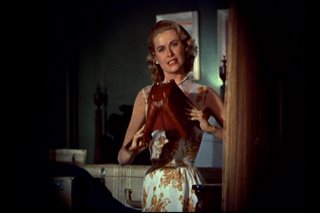 A critical error - Jeffries is distracted by another neighbour who appears to be taking an overdose of sleeping pills.
A critical error - Jeffries is distracted by another neighbour who appears to be taking an overdose of sleeping pills.
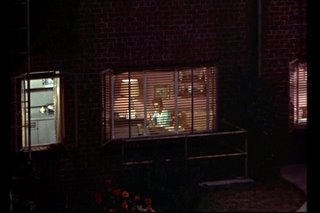
He doesn't notice Thorwald coming home.
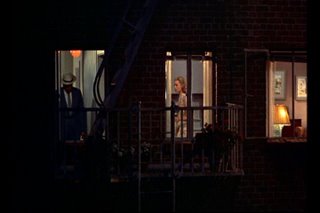 He calls the police.
He calls the police.
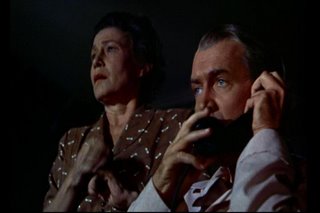 Thorwald catches Lisa in his apartment, and starts to assault her.
Thorwald catches Lisa in his apartment, and starts to assault her.
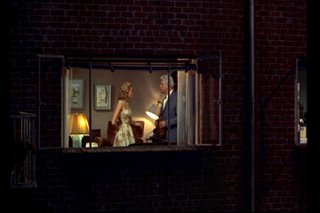
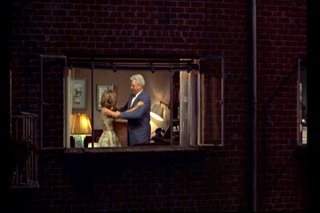 He turns out the lights, but the police arrive, just in time.
He turns out the lights, but the police arrive, just in time.
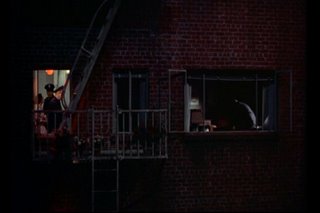 As the cops question Thorwald, Lisa indicates that she has the ring.
As the cops question Thorwald, Lisa indicates that she has the ring.
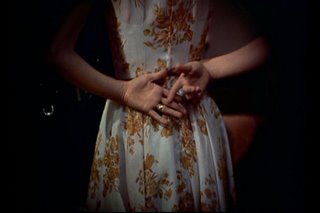 Thorwald sees her pointing it out....
Thorwald sees her pointing it out....
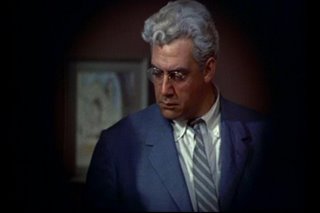 And looks across the way to see who is watching.
And looks across the way to see who is watching.
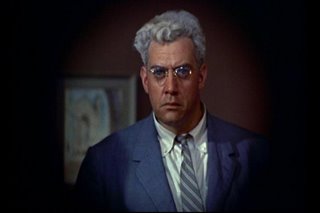 I apologize up front for choosing what is arguably the most obvious Hitchcock "Moment of Distinction", but I can't help it - I love this scene. I have probably seen Rear Window 8-10 times, and I get goose bumps every single time I watch this sequence.
I apologize up front for choosing what is arguably the most obvious Hitchcock "Moment of Distinction", but I can't help it - I love this scene. I have probably seen Rear Window 8-10 times, and I get goose bumps every single time I watch this sequence.
A couple of things. Stewart is just brilliant in this scene, his panic rising as he watches the woman he loves being threatened right in front of his eyes, and he can't help her. The other thing has had volumes written about it - How Hitchcock turns the tables on Jeffries (and us) by letting him be an observer, and them suddenly thrusting him into an active role in the drama across the way. When Thorwald looks over with that icy stare, the message is clear. You're involved now, buddy.
Blackmail (Hitchcock Blog-a-thon)
Blackmail is Hitch's first sound film, but curiously, it doesn't start out that way. The film opens on a police chase, and for the first 10 minutes, we are watching a silent picture. The cops are plainly talking to one another, and a suspect is interrogated, but it's all just lip movement. It's not till after that one of the cops mentions off-handedly "That didn't take as long as I thought" , that we slip fully into sound.
One of the cops we've been following is Frank Webber, and we stick with Frank as he finishes his day, and meets his girlfriend Alice for a night on the town. Alice, however, is a little miffed at Frank for taking so long, and she lets him know. He brushes off her moodiness with the nonchalant manner of a man who has gotten to taking his girl for granted. It doesn't look like anything more than a little spat.
However, when they get to their restaurant, things perk up a bit. Alice secretly pulls out a little slip of paper passed to her by another man, who is trying to get together with her. She makes an excuse to back out of a movie with Frank, because she wants to meet this new guy in that very restaurant. Frank goes off to his movie by himself, but not before seeing Alice on the arm of the other man.
The date with the second man (an artist named Crewe), goes along innocently enough and he invites her up to his place to see his studio. It's fairly plain to see that the artist is now trying to seduce Alice here, with his paintings and arty loft. She lets herself be led along, however, after he remarks that he'd like to sketch her.
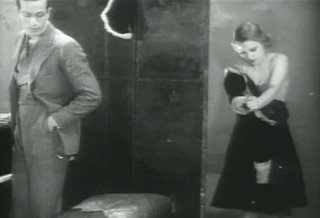
One thing leads to another, and Alice suddenly finds herself the target of an intended rape. The confrontation takes place behind a curtain, and a bread knife on the table suddenly finds it's way into Alice's hand. She stabs the artist to death. Watching this scene, it's not hard to notice that it was recycled years later in Dial M for Murder, as Grace Kelly dispatched her would-be-murderer with a pair of scissors.
It's in the aftermath of the murder, as Alice wanders the streets in a daze that we start to see a few Hitckcockian touches creep in. A neon sign featuring a martini shaker morphs into a hand with a knife. A gossipy visitor to her store prattles on about the murder, and the word "knife" repeatedly jumps out of her conversation, the rest of the words dissolving into mush.
Predictably enough, Frank is assigned to the murder investigation, and although he knows Alice was with the man, and finds her glove in his apartment, he keeps this information to himself. The blackmail of the title is introduced in the form of a shady little weasel named Tracy, who was hitting Crewe up for money and saw Alice go up to the apartment - And also saw Frank with her glove. This portion of the film is the weakest, as the blackmail only amounts to a box of cigars and a free breakfast. The film never really develops any tension around Tracy and his information, and when Tracy emerges as a possible murder suspect, the film simply skips to an extended chase scene.

In many of his films , Hitchcock would place the action in a well-known vista. Think of the Statue of Liberty in Saboteur, Mount Rushmore in North By Northwest, or Albert Hall in The Man Who Knew Too Much. It all began here , as the police pursue Tracy into the Brtish Museum, and he plunges through the top of the dome to his death.
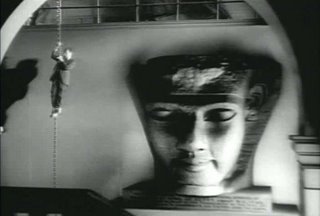
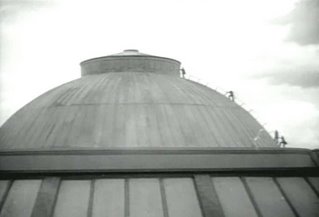
Alice is now off the hook, since Tracy dies as the chief suspect, but Hitch isn't really done with her yet. It was a recurring theme in Hitchcock's film that an attractive blond was dragged down and humiliated in some way, and this is one of the earliest manifestations of this. You can read the murder investigation and Alices' guilty conscience as being a penance for her infidelity. After all, she sneaked around on Frank behind his back and went up to the apartment of this shady artist. The fact that she never intended to sleep with the guy is not really germane.
It's not really spelled out either, but it is nonetheless a relevant point that because Frank covered up her involvement in the crime, she is now bound to him. She has traded one blackmailer for another.
Monday, November 06, 2006
Moments of Distinction
The Set-Up - Marty Maher (Tyrone Power) comes to see his wife Mary (Maureen O'Hara) in the hospital. She has miscarried with their first child.

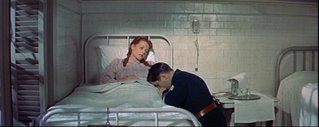

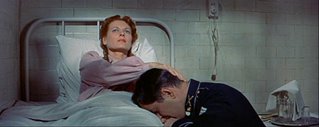
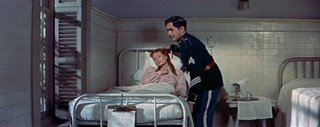
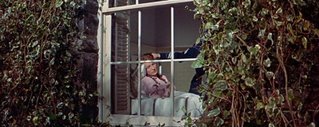 The two of them silently watch the cadets go by.
The two of them silently watch the cadets go by.
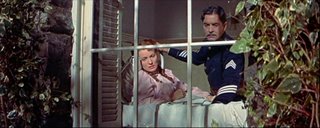
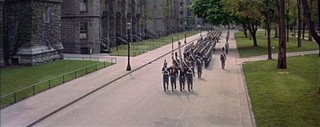 She talks about all the "fine boys" there, and asks Marty if he wants to stay. She feels that he will forever be reminded about the son that they will never have. Marty hardens and says that "This is no time to be sayin' such stuff", because he has recently re-upped.
She talks about all the "fine boys" there, and asks Marty if he wants to stay. She feels that he will forever be reminded about the son that they will never have. Marty hardens and says that "This is no time to be sayin' such stuff", because he has recently re-upped.
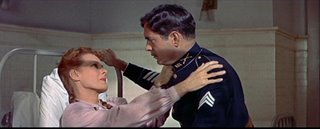
When I think of John Ford, and the things that make him so great, I always come back to this scene. He was sometimes taken to task for being overly sentimental, and this scene could be Exhibit A. Well, tough. The thing that makes this sequence stand out for me is the great love that Ford has for these two people at this tragic moment, and how he quietly assures us that they will get through it.
Ford was a longtime supporter of the US Armed Forces, as well as an Irish immigrant, and there can be no question that Marty Maher lives pretty close to John Ford's heart. And mine, too.
Sunday, November 05, 2006
On this Date
 The great Ward Bond died on this day in 1960.
The great Ward Bond died on this day in 1960.To celebrate the career of the Dean of Character Actors, go pick a great movie - chances are, he's in it. That's an exaggeration, but not by much. The Searchers, The Maltese Falcon, It's a Wonderful Life, Sergeant York, My Darling Clementine, On Dangerous Ground, Fort Apache, Gone with the Wind, The Grapes of Wrath.......
Thursday, November 02, 2006
Blast of Silence
"You were born in pain." are practically the first words we hear, and the film's narrator goes to great lengths to establish hit man Frankie Bono as a cold loner. He's in New York to kill a mid-level mobster named Triano, and we get to watch him as he goes through the routine of setting up for the hit. He says virtually nothing in these opening passages, and our info is fed to us by the films peculiar narrator, who narrates by talking directly to Frankie. It's a device which I haven't encountered before, and it runs the risk of becoming distracting. In this film, however, it's strangely effective in establishing Frankie's tough-as-nails world.
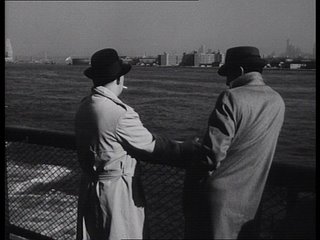 The first step is to get a gun, and this leads to a meeting with a repulsive porcine hood named Ralphie. This scene is perhaps the first indication that Blast of Silence is going to be something more than just another mob movie, as Ralphie shuffles around, feeding his pet rats table scraps and drawing out the gun deal. Ralphie is cloyingly friendly, and a unmistakable feeling of unease is created. We just KNOW that this guy is going to figure into things again.
The first step is to get a gun, and this leads to a meeting with a repulsive porcine hood named Ralphie. This scene is perhaps the first indication that Blast of Silence is going to be something more than just another mob movie, as Ralphie shuffles around, feeding his pet rats table scraps and drawing out the gun deal. Ralphie is cloyingly friendly, and a unmistakable feeling of unease is created. We just KNOW that this guy is going to figure into things again.
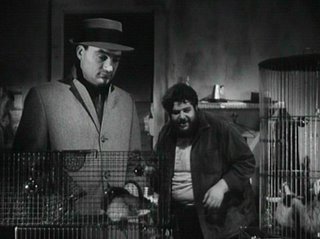 By this time, Frankie has started to scope out the target, and during a down period, runs into an old acquaintance from his youth. Frankie doesn't really want anything to do with the guy, but he's persistent, and eventually Frankie finds himself accepting an invitation to a party. The hit man starts out sitting by himself, but gradually gets lured into a dance with a girl named Lori. Then another, and another, and then somehow gets involved in a bizarre game of pushing as peanut with his nose. The thing is, the cold loner assassin finds himself enjoying this frivolity, as foreign as it is to him.
By this time, Frankie has started to scope out the target, and during a down period, runs into an old acquaintance from his youth. Frankie doesn't really want anything to do with the guy, but he's persistent, and eventually Frankie finds himself accepting an invitation to a party. The hit man starts out sitting by himself, but gradually gets lured into a dance with a girl named Lori. Then another, and another, and then somehow gets involved in a bizarre game of pushing as peanut with his nose. The thing is, the cold loner assassin finds himself enjoying this frivolity, as foreign as it is to him.
It's an inspired plot point that the events of BoS take place over Christmas, for two reasons. First, it amplifies Frankie's loneliness, and second, it just gives the film a cool look. BoS was made on a shoestring budget, but it never looks cheap, even remotely. There are a lot of shots done on location on the streets of New York, and with the Christmas decorations and the carols playing in the background, the film is utterly realistic.
Although it's hard to detect from his demeanor, Frankie changes subtlety after the party. Consider the following day when he is staking out the mobster as he leaves church. The narrator intones "You hate Christmas so much you can't stand sweating it out in a crummy hotel room." What's up with that line? Frankie goes back to Lori's apartment, and the two share a meal together. After dinner they talk, and Frankie comes very close to letting down his guard with her. She gets a little too close, however, and the walls go back up around Frankie.
Then, a mistake. Watching Triano one night at a club, he sees the gun dealer Ralphie in the crowd. As a conga player sings songs about jealousy and murder, the big man puts two and two together. He suggests to Frankie that since he's going to whack a mob guy, the price of the gun will be going up. This leads to Frankie following the dealer home and murdering him in his apartment. The level of violence in this scene is striking for a film made in 1961. Frankie first attacks with an ax, and when Ralphie fights back, he beats him with a lamp and savagely strangles him with the cord. The murder is brutal and sloppy.
Frankie now feels that the job has been compromised, and tries to back out of it. His bosses, however are having none of it. There's a great phone conversation where Frankie is told "For thinking what you just said, you're in trouble." So now he has to go through with the hit, but first he makes an ill-advised stop at Lori's apartment. As he starts to express his feelings for her, they are interrupted by another man, and you can just see Frankie fall apart. Whatever he felt he might have had with this girl is vaporized. His fate is sealed.
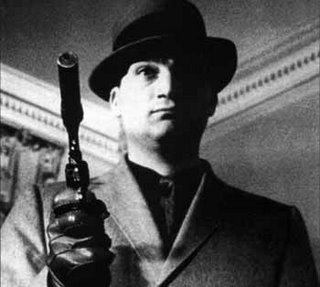 There is still a job to do, however, and the hit gets carried out as planned. Now, Frankie just wants to get his money and be left alone, but we remember that phone conversation, and when Frankie goes to a wind-ravaged marsh to collect his fee, we know what he's going to find there. Maybe he does, as well. There's the hint that he might have given himself up, and is willingly going to his death. It's hard to imagine why else he would go there unarmed after being told he was in trouble.
There is still a job to do, however, and the hit gets carried out as planned. Now, Frankie just wants to get his money and be left alone, but we remember that phone conversation, and when Frankie goes to a wind-ravaged marsh to collect his fee, we know what he's going to find there. Maybe he does, as well. There's the hint that he might have given himself up, and is willingly going to his death. It's hard to imagine why else he would go there unarmed after being told he was in trouble.
Blast of Silence was the brainchild of a man named Allen Baron, who wrote it, directed it, and starred as Frankie Bono. He brings to mind Robert DeNiro ,or a young George C Scott, and does a great job embodying this man who is so disconnected from those around him.
Note: I would be sadly remiss if I did not thank my friend and fellow blogger Steve Carlson for introducing me to this nasty little jewel on his terrific site, and for sending me a copy. Thanks again, Steve.



